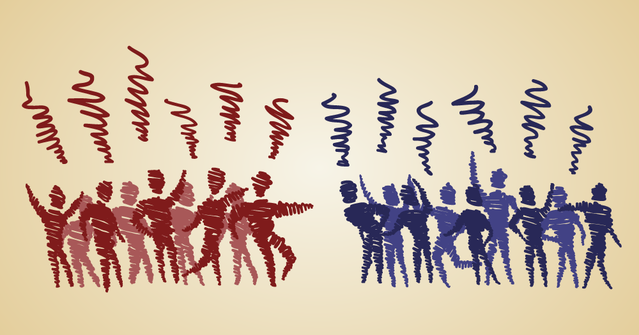Coronavirus Disease 2019
A Plea for Empathy and Compassion in the Time of COVID-19
Distrust isn't an inevitable outcome of the pandemic.
Posted October 9, 2020

During the current COVID-19 pandemic, all of us are confronting stressful decisions about our safety and well-being that we couldn’t have imagined a year ago. Suddenly, small decisions, such as whether to go shopping, or to work or to school, are fraught with uncertainty and fear. Even our relationships with friends and loved ones are being tested in new ways. COVID-19—at its worst, deadly; at its best, frightening—is wreaking havoc with the very social contracts that allow us to function as a civil society. The sense that we can depend on one another, that people in power will act responsibly on our behalf, and that we have a baseline of rules for social exchanges have all been thrown into question.
Although it’s a complicated project, our mental and physical wellbeing requires a return to empathy and compassion.
Writing in the American Journal of Medicine, cardiologist Michelle M. Kittleson describes how one of her heart patients, someone she had built a trusting relationship with over 10 years, desperately wanted her to prescribe hydroxychloroquine to prevent COVID-19, even though there was no evidence that the drug would reduce the severity of illness or increase the odds of survival. After Dr. Kittleson outlined the potential side effects and drug interactions, the patient still responded with anger and dismay. Disturbed, Dr. Kittleson reflected, “He had weighed my medical expertise against that of the president and found me lacking. Did he really not trust me anymore?” After some soul-searching, the physician recognized that she had not acknowledged her patient’s fear of dying of COVID-19. She reached out again with less medical data, and more empathy and compassion. In the follow-up phone call, the doctor empathized with the patient’s unspoken fear that, as an older man with a cardiac condition, he was at high risk for fatal respiratory failure from COVID-19. “He ended our call by asking, ‘Are we OK?’ He too sought to repair our fractured trust.” She concludes, “Patients need to know that we, as physicians, will not abandon them if we disagree. When this pandemic ends, our trust will be stronger for it.”
We are all vulnerable during the pandemic, as patients and citizens. But if we feel that others are considering our best interests, trust need not break down. Trust doesn’t require 100% agreement, but it does require empathy. We can disagree with each other, but every American is confronting the shared reality of COVID-19. Trust that transcends individual difference is needed more than ever.
The labor market is another arena where COVID-19 has eroded trust. Too many Americans lost their jobs, many take risks as essential workers, and millions have been asked to work from home. Transitioning to remote work was challenging and often overwhelming. Unfortunately, instead of compassion, millions of workers were treated with distrust and increased surveillance by bosses and managers. David De Cremer writes, “The controlling behavior that many managers have displayed during the COVID-19 crisis painstakingly makes clear that companies have problems in establishing and communicating trust to their employees.” The demand for productivity without compassion leads to surveillance, micro-managing, and other distrustful behaviors. “When managers resort to actions that signal the need to control the actions of the other, then vulnerability is taken out of the equation and no trust will be experienced,” De Cremer writes. Too many workers feel that their employers simply do not care about them.
Instead of monitoring employers more intensively, managers should “change their default attitude,” DeCremer recommends. “The default should be that you expect employees to be at work, because once they notice that you are willing to be vulnerable by trusting them—rather than deciding to check up on them every hour of the day—trust and all its benefits will be alive in your employees and the performance they will subsequently give you.” Now more than ever, he notes, employers need to be able to give employees the freedom to brainstorm creative solutions and help each other.
Some companies have learned these lessons the hard way. Workers who don’t trust their employers lack loyalty and certainly won’t go the extra mile for their boss. Companies that are empathetic to their employees, by contrast, are more likely to succeed, financially and morally. This is especially true for companies in which many workers couldn’t shift to remote work. For example, Target rolled out a wage hike and expanded benefits for store employees, as well as a 30-day paid leave for employees who are 65 or older or pregnant, or who have underlying health conditions. The lesson: compassion helps build trust even under the most challenging economic conditions.
As citizens, we are also divided and distrustful. The politicization of COVID-19 has placed us at a dangerous crossroad. Depending on which party you align with, who you trust differs greatly. David Ropeik points out the danger of losing trust with government agencies, such as the CDC, the FDA, and the World Health Organization: “Without trust in the integrity of the agencies that oversee our public health and medical systems, we are less likely to take the vaccines they say are safe, to follow the policies and guidelines they recommend will protect us, or believe the scientific facts their expertise provides to help us make the healthiest possible choices.”
Ropeik and others fear that distrust has spread beyond COVID-19 to any initiatives that carry the FDA, CDC, or NIH “brand.” He points out that a lack of trust can spread disease and death, “because viruses and bacteria don’t give a damn about what party you belong to.” Indeed, politicizing certain behaviors, such as mask wearing to curb the spread of the virus, leads to unsafe behavior. Fanning the flames of distrust might be politically expedient, but the long-term consequences for Americans’ mental and physical health is devastating.
Neither paranoia nor disdain are appropriate responses to the pandemic: One threatens our mental health; the other, our physical safety. Our leaders need to unify and find a middle path based on expert knowledge. Imagine if we could move beyond distrust to agree on a concerted national effort to have all citizens wear masks. Imagine if we believed that our leaders cared about our well-being and trusted their leadership. Perhaps we could work together as citizens to protect each other instead of mocking, arguing, and shaming each other in grocery stores, social media, and the press. Promoting national values of compassion and empathy would help citizens confronting risk, symptoms, treatment, testing, and loss. When it comes to COVID-19, leaders at every level should promote the undeniable truth that, despite our differences, we are all in this together.


